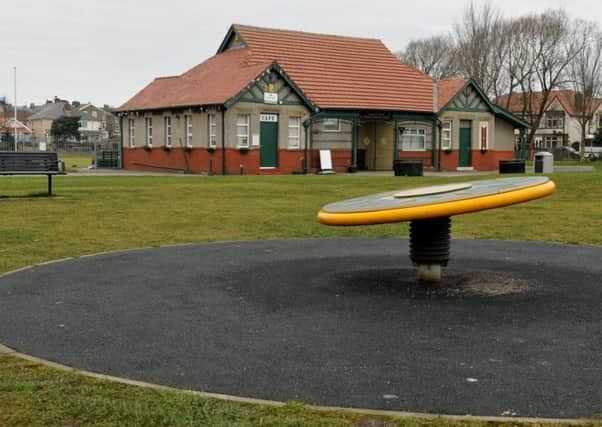Lancaster University pilot project helps get Morecambe back in business


For many people, finding a route back into employment can be a difficult task.
But a European initiative led by a Lancaster University academic is giving them the helping hand they need.
Advertisement
Hide AdAdvertisement
Hide AdAnd following the success of a pilot scheme in the West End of Morecambe, the project is now being rolled out in other parts of the country.


Dr Carolyn Downs – who lives in the West End of Morecambe – has been leading the project to develop a new training programme to get people from hard to reach groups within communities back into work
These can include those out of work for long periods of time, recovering addicts, single mothers and older women.
The project works by by giving them confidence and tools they need to set up their own businesses.
Advertisement
Hide AdAdvertisement
Hide AdThe programme is designed to be accessed within accessible community hubs like launderettes and cafés rather than formal or educational settings that can put people off – and the results have been pretty inspiring.


The scheme has been run in four countries including the UK, and has been piloted in Morecambe.
The university is now receiving a string of feedback from people who took part in this programme who are now employed – many have launched their own businesses.
Due to its success, a first wave of training has also been rolled out in the Islington Council Estate in Salford – following investment by Salford City Council – and training in Morecambe is to begin again this month.
Advertisement
Hide AdAdvertisement
Hide AdDr Downs, a senior lecturer with a particular interest in the role of entrepreneurship and enterprise education in societies, as well as the organisation and management of healthcare services, spoke at the public meeting into child poverty in Morecambe last month, leading a discussion about the need for increased training and job opportunities in the community.
As a result, one of the things that the community said they’d want to pursue is a community-based training centre – of which this project, named Eliemental, is likely to be a part.
One of the project’s first success stories is Graham Buckley, who now runs the Pavilion café/bar in Regent Park in the West End.
Before going on Eliemental training, Graham had been out of work for a long period of time.
Advertisement
Hide AdAdvertisement
Hide AdHe has since has set up the community café and in addition to running his own business, has managed to improve the area for the community.
The park is now accessible to the community and anti-social behaviour reports have dropped considerably, and he’s also offered work experience placements to local youngsters.
The Eliemental project has shown how enterprise can transform the lives of the excluded, vulnerable and disadvantaged – just as long as the ‘entrepreneur’ label and all its associated baggage is left behind.
Dr Downs said: “Jobs markets are competitive, rule-bound and exclusive – and not just at the top.
Advertisement
Hide AdAdvertisement
Hide Ad“Significant numbers of people from different excluded groups can’t see how they can ever break into the system of demonstrating specific qualifications, skills and experience – being the right ‘type’ – leaving them in poverty, isolated, and unable to participate in communities.
“That includes those with physical disabilities, issues with mental health as well as migrants, young offenders and people who’ve just slipped into a NEET (not in education, employment or training) way of life.
“Starting your own business can help anyone skip over some of the rigid barriers. Just an idea and energy is all that’s needed to at least get started.
“The history of business is one of how excluded religious and ethnic groups have been forced into starting their enterprises, using their exclusion as a powerful motivation.
Advertisement
Hide AdAdvertisement
Hide Ad“So why, in our times, aren’t more disadvantaged people using this route?
“In our experience, the biggest barrier to more people starting businesses is the image of the ‘entrepreneur’, built up as the wealth-generating hero since the 1980s, and turned into a cultural phenomenon by popular media representations in programmes like The Apprentice and Dragon’s Den.
“The entrepreneur has become caricatured as the go-getter who always gives 110 per cent, who’s always sharp-suited and well-groomed.
“They have to prove themselves under pressure and can never stumble or will be ridiculed by the hard-talking entrepreneurs who have already proved themselves in the crucible of business.
Advertisement
Hide AdAdvertisement
Hide Ad“It’s an image that is believed to be behind the relatively low numbers of women who start businesses – just 30 per cent in the UK – as well as to immigrants unused to a new country’s culture, along with the disadvantaged in general.”
Eliemental has been an EU-funded project led by Lancaster University Management School, running in the UK, Greece, Poland and Romania, aimed at finding out what stops people from being enterprising and how to help ordinary people start businesses.
The Lancaster team worked alongside co-researchers from local communities. Lodz (Poland), Targoviste (Romania), Thessaloniki (Greece) and in three UK settings – Lancaster, Manchester and the east of England.
“The key to Eliemental has been getting to work with hard-to-reach groups of people, and making sure it wasn’t a project where a university sat at a distance to reflect, but was fully involved,” Dr Downs said.
Advertisement
Hide AdAdvertisement
Hide Ad“We worked locally with university partners but also with probation services, chambers of commerce, charity initiatives and housing associations.
We looked hard to find the real community access points, places where people felt were familiar and comfortable.
“There’s no good in inviting socially excluded groups to colleges, government buildings or even hotels and libraries.
“They’re too official or associated with the trappings of the wealthy and places where they will be judged and assessed.
Advertisement
Hide AdAdvertisement
Hide Ad“So access points were set up in launderettes, betting shops, street markets and cafés, well-established community centres.
“We also learnt to use other language than that typically used around ‘entrepreneurs’ – the people who became part of Eliemental programmes never used the word, or wanted to, preferring to see themselves as ‘self-employed’, an ‘owner’ or ‘manager’, or in one case just as a ‘busy mum and housewife’.
“A key issue among the excluded groups is not knowing how to write a business plan, but wanting to start a business in the first place, being able to identify themselves with the opportunity, that it was a possibility.
“We began with identifying the top 10 skills needed: the importance of confidence in particular, but also around communication skills, problem-solving and creating networks of people.
Advertisement
Hide AdAdvertisement
Hide Ad“Business planning comes at the end. A toolkit was created around these underpinnings to help people get started, delivered by local groups.
Materials have been made available online, but the focus was on making sure there was engagement through face-to-face work.
“While online learning can sometimes be seen as a panacea, we found that access to the Internet was more often through mobile phones, and not seen as being a tool for learning.”
Around 35 per cent of the participants in Eliemental so far have gone on to start their own business in the UK, Greece and Romania, and more than 25 per cent in Poland.
Advertisement
Hide AdAdvertisement
Hide Ad“For groups often facing severe and complex personal issues and disadvantages, the success rate is high and has demonstrated the importance of the approach,” Dr Downs said.
“The stages from initial engagement to going full-time in business can be a slow burn.
“Eliemental provides the all-important initial impetus and germ of an idea, and many participants then moved on to be involved with other business support programmes to convert their enthusiasm.
“Resulting enterprises have been thoughtful and creative, linking into personal interests – an agoraphobic has set up craft workshops, and members of Romany communities in Romania have started floristry, recycling and cleaning businesses.”
Advertisement
Hide AdAdvertisement
Hide AdThe success of Eliemental has seen it selected as one of the best initiatives in Europe for supporting third country nationals.
Organisations such as Job Centre Plus in the UK are now planning to roll out the Eliemental approach through its network.
Dr Downs said: “We’ll be meeting with UK Government departments for education and health to discuss how the approach can be a platform for social integration, community cohesion and support local economies.
“High on our agenda will be the role of benefits. A black and white position of either claiming benefits or not doesn’t help start-up owners, especially those with health problems, a disability or mental health issues, who need the security and flexibility of a level of support.
Advertisement
Hide AdAdvertisement
Hide Ad“There are always going to be ups and downs in the early years, and an all or nothing system won’t help the many motivated and capable people who have the potential to be doing much more.”
- Eliemental training materials, updates on developments and events can be found at www.eliemental.org
GRAHAM’S STORY
Since taking part in the Eliemental programme Graham Buckley has started to run a council-owned café and bar in a park in the West End area of Morecambe.
“Before I went on the Eliemental training I would never have thought of doing my own business,” he said. “It gave me the incentive to say ‘yeah you can’.
Advertisement
Hide AdAdvertisement
Hide Ad“It was broken down easily and looked at how to prioritise. It gave you that encouragement, so it wasn’t as daunting. I wouldn’t have been able to do it if I hadn’t gone on that course.”
Based on the motivation provided by the training, and support in putting together a professional business plan, Graham was able to negotiate a better lease agreement.
“It helped to structure how your business would run and tie everything together,” he said. “Even now if anything gets daunting I’ll take a step back and think what the training said to do.
“The main thing is that it gives you confidence, makes you think and believe in your own ability, because it’s easy to doubt yourself.
Advertisement
Hide AdAdvertisement
Hide Ad“The café had been shut for several years, so it was about building up the clientele again and having the understanding that it’s not going to happen overnight. There was the challenge of starting from scratch and buying all the equipment and coming up against things you aren’t expecting.
“I wanted to give something back to the community, that’s the reward.
“Being in the West End it’s not the richest of areas. There’s a transient population and you struggle to get people together.
“When I opened the café up it was my idea to keep it cheap and cheerful and I’ve seen the difference in the last two years in the people that use the park, and they’re saying ‘whatever you’re doing, keep doing it’.”